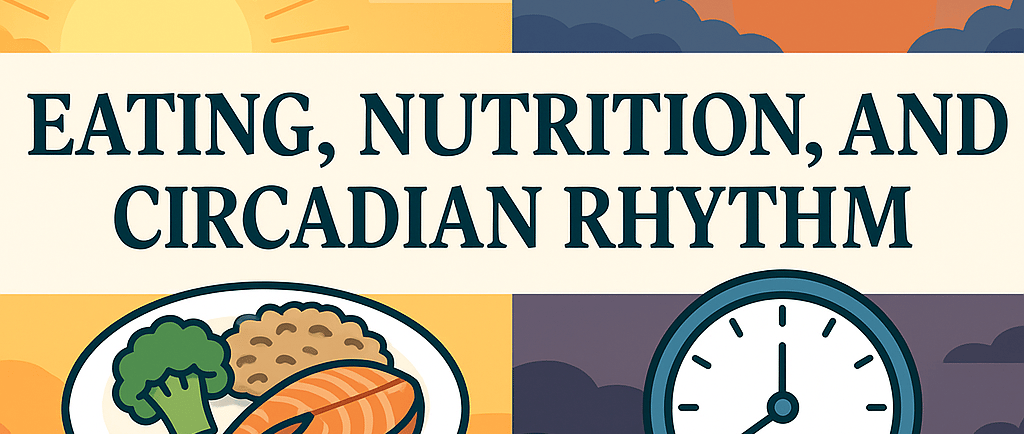Eating, Nutrition, and Circadian Rhythm: Aligning with Sunrise and Sunset
In today’s fast-paced world, we often overlook a fundamental truth: our bodies are deeply connected to the rhythms of nature. The cycles of sunrise and sunset influence not just our sleep patterns but also our metabolism, digestion, and overall health. Eating in harmony with these natural rhythms—a concept rooted in circadian biology—can bring transformative benefits to your well-being.
NUTRITION
5/2/20253 min read


Eating, Nutrition, and Circadian Rhythm: Aligning with Sunrise and Sunset
In today’s fast-paced world, we often overlook a fundamental truth: our bodies are deeply connected to the rhythms of nature. The cycles of sunrise and sunset influence not just our sleep patterns but also our metabolism, digestion, and overall health. Eating in harmony with these natural rhythms—a concept rooted in circadian biology—can bring transformative benefits to your well-being.
What is Circadian Rhythm?
Circadian rhythm is your body’s internal clock that governs various physiological processes over a 24-hour cycle. It is influenced by light, darkness, and other environmental cues. This rhythm determines when you feel awake, sleepy, or hungry and regulates critical functions such as hormone production, digestion, and metabolism.
Aligning your eating patterns with your circadian rhythm means consuming food during periods of natural light (sunrise to sunset) and avoiding heavy meals after dark.
The Science Behind Eating with Sunrise and Sunset
Morning: Optimize Energy Levels
After sunrise, your body is primed to digest and metabolize food efficiently. Cortisol levels peak in the morning, boosting your alertness and metabolism.
A nutrient-dense breakfast with complex carbohydrates, proteins, and healthy fats can set the tone for sustained energy throughout the day.
Afternoon: Peak Digestive Capacity
Midday is when your digestive system is at its strongest, thanks to increased enzymatic activity.
Make lunch your largest meal of the day, focusing on a balance of macronutrients like whole grains, lean proteins, and colorful vegetables.
Evening: Prepare for Rest and Recovery
As the sun sets, your body begins to produce melatonin, signaling it’s time to wind down. Eating late can disrupt this process, leading to poor sleep and metabolic inefficiency.
Opt for a light dinner with easily digestible foods like soups, salads, or steamed vegetables, and finish your meal at least 2-3 hours before bedtime.
Benefits of Aligning Meals with Circadian Rhythm
Improved Digestion
Eating during daylight hours supports your digestive organs, which work best when the body is active and alert. Late-night eating can strain the digestive system, leading to discomfort and weight gain.Enhanced Metabolic Health
Studies have shown that eating in sync with circadian rhythms improves insulin sensitivity, reduces the risk of diabetes, and promotes fat metabolism.Better Sleep Quality
Avoiding food close to bedtime helps your body focus on rest and repair, leading to deeper, more restorative sleep.Natural Detoxification
During the night, your liver and other organs detoxify your body. A light evening meal allows this process to function optimally.
Practical Tips to Align with Sunrise and Sunset
Set a Meal Schedule
Breakfast: Within an hour of waking up, ideally by 8:00 AM.
Lunch: Between 12:00 PM and 2:00 PM, making it the largest meal.
Dinner: Finish by 7:00 PM or at least 2 hours before bedtime.
Mind Your Meal Size
Prioritize hearty meals earlier in the day and lighter meals in the evening.
Hydrate Wisely
Drink water throughout the day but reduce intake close to bedtime to avoid disrupting sleep.Choose Whole Foods
Incorporate whole grains, seasonal fruits, fresh vegetables, and lean proteins to provide your body with the nutrients it needs for energy and recovery.Avoid Late-Night Snacks
If you feel hungry after dinner, consider a small portion of easily digestible food like a handful of nuts or a warm herbal tea.
A Timeless Approach to Health
Aligning your meals with the natural cycles of sunrise and sunset isn’t a new concept. Ancient traditions like Ayurveda and traditional Chinese medicine have long emphasized eating during daylight hours. Modern science now validates these practices, highlighting the profound impact of circadian rhythm on metabolism and overall health.
Final Thoughts
Your body thrives on consistency and harmony with nature. By eating in alignment with the rhythms of sunrise and sunset, you can enhance digestion, improve energy levels, and foster better long-term health. Start small by adjusting your dinner time or focusing on a wholesome breakfast, and let the rhythm of the sun guide you toward a balanced and fulfilling lifestyle.
For more insights on nutrition and holistic well-being, explore our other articles at NaatiBru. Let’s make every meal a step toward a healthier, more vibrant you!
